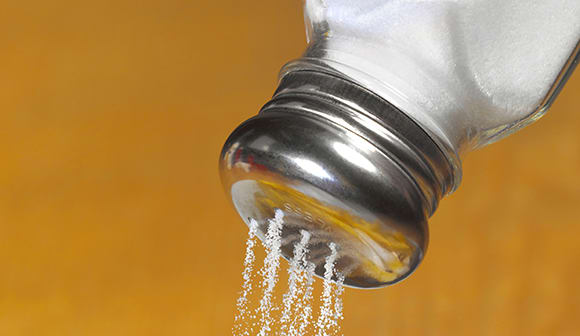Sodium conundrum
What craving salt says about your health.
Article Date:

How many times have you seen someone reach for the saltshaker as soon as their food is placed in front of them? What’s behind our love affair with salt and what does craving it say about our health?
Despite all the negative things you’ve probably heard about sodium, the body needs a certain amount of it.
“Salt is essential because it helps regulate certain bodily processes,” said Henry Greene, DO, an internist with Baptist Primary Care at Regency Square. “It helps nerve cells communicate with each other, aids muscle movement and maintains the body’s proper fluid balance.”
But, like most things in life, it’s all about moderation. Too much salt can raise your blood pressure.
“Think about your blood vessels as being the body’s pipes,” said Dr. Greene. “When we consume a lot of salt, we retain more fluid because salt is a magnet for water. The more fluid there is in our pipes, the more pressure we exert on the walls or blood vessels.”
Not enough salt leads to a lack of fluid, which can cause lethargy, headaches and, in some cases, seizures.
“It's really about finding that perfect balance,” Dr. Greene said.
How much salt do I need?
The recommended daily amount of sodium varies depending on personal medical history, but according to the American Heart Association, the average person should consume no more than 2,300 mg of sodium a day. This roughly equates to one teaspoon of salt.
The daily allowance is much less – no more than 1,500 mg – for people with certain chronic medical conditions such as congestive heart failure and cirrhosis of the liver.
Causes of salt cravings
We crave salt for a wide variety of reasons. A few of them are:
- Dehydration. “Let’s say it’s a hot summer day, you’ve been out at the beach or on the golf course, and you’ve lost a lot of fluid and salt in your sweat,” said Dr. Greene. “Our thirst mechanism and our craving for salt – which again, help us retain fluid – kick in to help us to get more of that plasma volume back into our pipes.”
- Addison's disease. A condition in which the adrenal glands don’t produce enough of the hormones needed to regulate important body functions and respond to stress.
- Bartter syndrome. A condition caused by a defect in the kidney’s ability to reabsorb sodium.
- Hyponatremia. A condition in which a person's sodium levels are lower than normal.
- Stress. “It can be environmental, work-related or due to relationships,” said Dr. Greene. “The stress craving is probably more prevalent than we actually acknowledge.”
Pass (on) the salt
If you’re concerned that you’re consuming too much salt, there are steps you can take to modify your diet:
- Don’t eat out too often. “This is something I’m guilty of,” said Dr. Greene, who added that restaurant dishes often are loaded with salt to enhance their flavor. When you do dine out, opt for low-sodium options such as broiled, baked or roasted fresh cuts of meat with sauces on the side.
- Avoid pre-packaged and processed foods. They may be convenient, but the tradeoff is that they’re usually high in sodium because salt is used as a preservative. In fact, the Food and Drug Administration estimates more than 70% of dietary sodium comes from packaged and prepared foods.
- Buy fresh fruits and vegetables when possible. Fresh is best but if you do buy frozen veggies, make sure they are “fresh frozen” and don't contain added spices or sauces. For canned vegetables, Dr. Greene advised pouring out the liquid and giving them a good rinse to reduce the amount of sodium you’re consuming.
- Read labels. It’s important to check the nutrition labels on foods to see how serving sizes stack up against the daily recommended amounts. “It just comes down to checking the labels and making smart choices,” said Dr. Greene.
- Check your spices. You don’t need salt to spice up your life. There are so many salt-free seasonings available nowadays. “They’re great because they offer the flavor profile of good quality food without the additional sodium,” said Dr. Greene.
If you would like to learn more about how to lower your salt intake, Baptist Health can help you find the right primary care doctor for you. To find a new provider, contact our care coordinators online or call 904.202.4YOU (4968).




